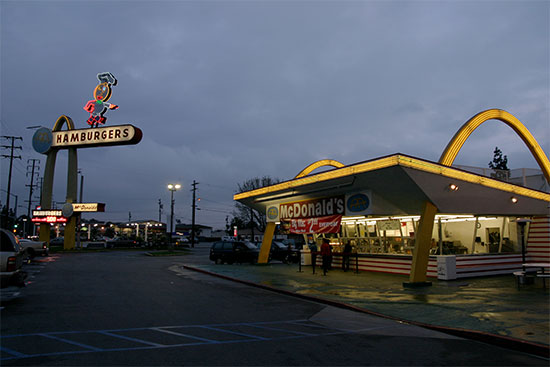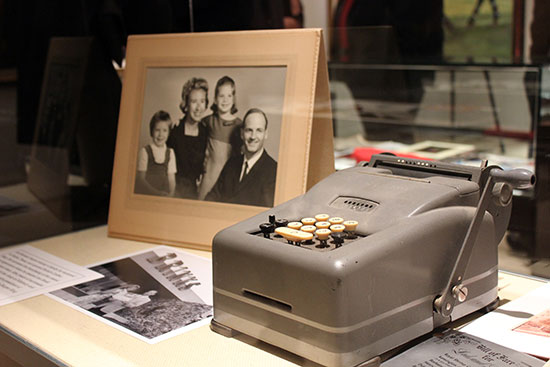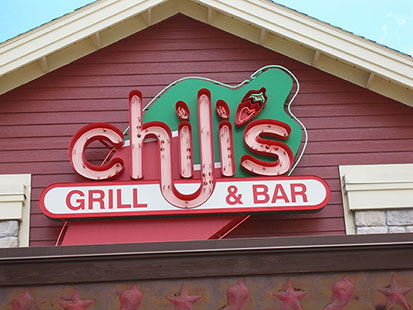Norman Brinker and Restaurant Chains
by Andrew Boyd
Today, one link at a time. The University of Houston's College of Engineering presents this series about the machines that make our civilization run, and the people whose ingenuity created them.
Where did you eat last night? If you're like many people, you might answer "at a restaurant." And not just any restaurant, but one of the many chain restaurants that line busy streets and fill crowded shopping malls. Though today they're ubiquitous, the concept of a chain is relatively new.
A major milestone in the history of restaurant chains occurred when the McDonalds brothers brought assembly line efficiency to their California hamburger operation in 1948. The ensuing 50s proved to be the temporal cradle of the fast food industry. Burger King. KFC. Taco Bell. Names that represent only a fraction of the fast food frenzy that gripped culinary entrepreneurs of the era.

The oldest operating McDonald's restaurant was the third one built, opening in 1953. Located at 10207 Lakewood Blvd. at Florence Ave. in Downey, California.
[Wikipedia]
But there's a large gap between fast food and fine dining -- a gap that was waiting to be filled by innovators looking to satisfy our hunger. Among those innovators was Norman Brinker. Brinker began his career working for Jack in the Box when it had only five locations. He quickly became a partner, and for seven years helped build the chain. In 1964 he left on good terms with owner and mentor Bob Peterson and went on to start his own restaurant in Dallas -- a restaurant called Steak & Ale that he'd develop into a successful chain. Steak & Ale was a break from the fast food model, offering patrons the chance to sit down and be served. It was instrumental in defining the restaurant category now known in the industry as casual dining. Among the innovations credited to Brinker were the salad bar and the greeting "Hi, my name is Andy, and I'll be your waiter tonight."

Norman Brinker and family on display at the Conrad N. Hilton College of Hotel and Restaurant Management, the University of Houston.
[Picture by Mark Young.]
Brinker eventually sold Steak & Ale to Pillsbury. He stayed on with Pillsbury for many years, rising to serve as President of the company's restaurant group. But his inner entrepreneur proved restless, and in 1984 he left Pillsbury and purchased a collection of 23 restaurants going under the name of Chili's. Today, Chili's has over 1500 locations.

Chili's Restaurant, 2006
[Flickr]
Brinker died a wealthy man in 2009. But his success lies less in the restaurants he left behind than the people he helped. Brinker wasn't just a leader, but a passionate mentor -- even when mentorship might conflict with his own financial gain. A display at the University of Houston's Hilton School of Hotel and Restaurant Management lists fully 53 restaurant chains whose origins trace their lineage to Brinker. Brinker also provided money and counsel when his former wife Nancy Brinker established the Susan G. Komen Breast Cancer Foundation.
At times it seems like restaurant chains are slowly homogenizing our diet. And in large part, that diet isn't helping our waistlines. But chains go to great lengths to develop food and settings that appeal to patrons. And they offer consistency in both quality and flavor. Judging by their financial success, carefully engineered food is sometimes just what we're looking for.
I'm Andy Boyd at the University of Houston, where we're interested in the way inventive minds work.
(Theme music)
Notes and references:
Special thanks to Mark Young, curator of the Massad Family Research Center and Hospitality Industry Archives, part of the Conrad N. Hilton College of Hotel and Restaurant Management at the University of Houston
R. Ruggless, 'Brinker Leaves Legacy of 'Integrity and Honor,'' Nation's Restaurant News, June 22, 2009. See also: http://nrn.com/corporate/brinker-leaves-legacy-integrity-and-honor. Accessed December 17, 2013.
'Norman Brinker Dies at 78; Restaurateur Helped Create a New Way to Dine,' Los Angeles Times, June 10, 2009, obituaries. See also: http://www.latimes.com/news/obituaries/la-me-norman-brinker10-2009jun10,0,5484478.story#ixzz2nqjf08zY. Accessed December 17, 2013.
'Norman Brinker,' The Dallas Morning News, June 13 and 14, 2009, obituaries. See also: http://www.legacy.com/obituaries/dallasmorningnews/obituary.aspx?page=lifestory&pid=128357964. Accessed December 17, 2013.
This episode first aired on December 19, 2013.